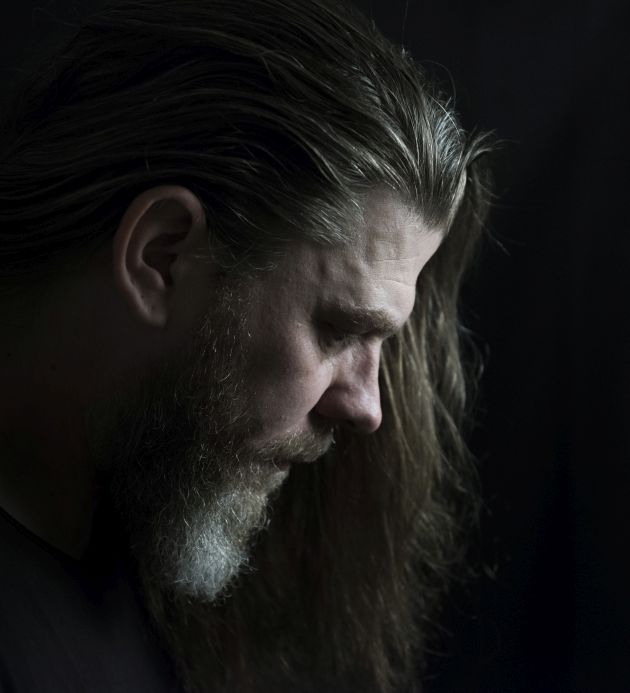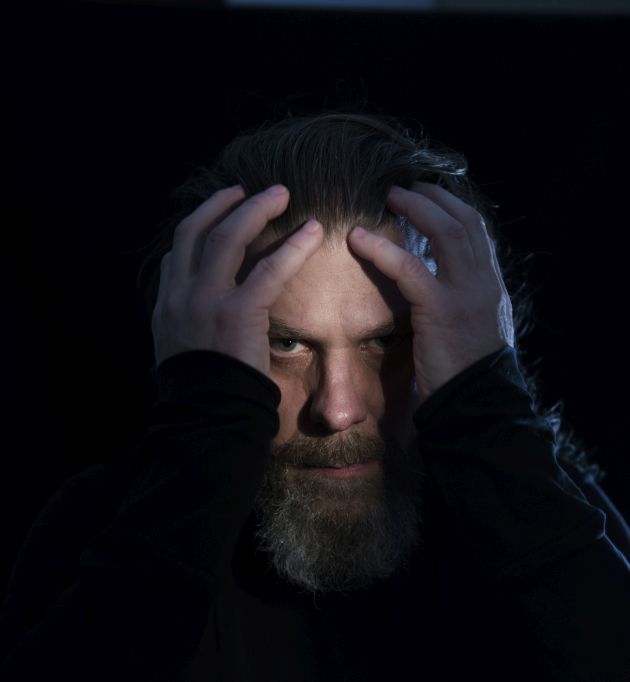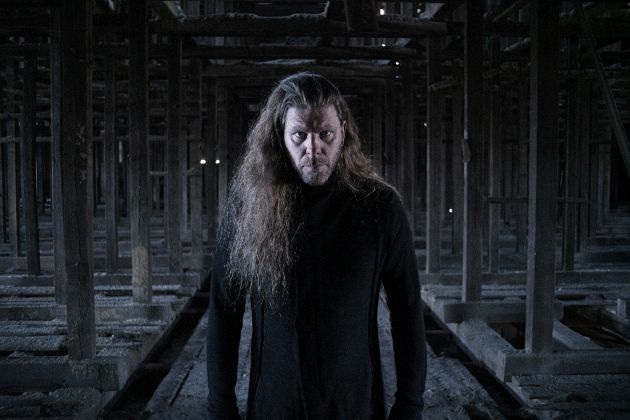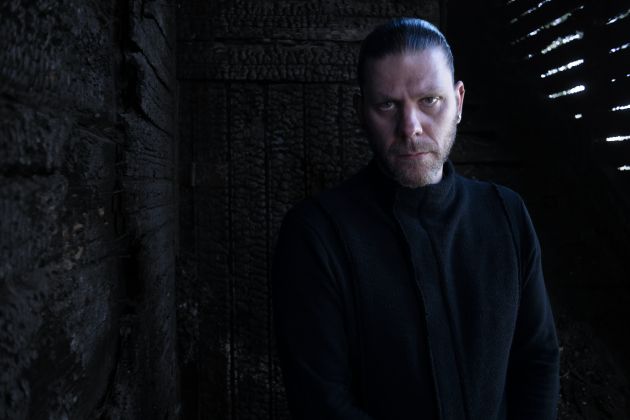 Interview with
Interview withAdrian Hates (music, vocals, production) from Diary of Dreams
It’s a grey Monday afternoon when I catch up with Adrian Hates for a phone interview, just as DIARY OF DREAMS prepare to embark on their “Dead End Dreams Tour”. In the midst of final rehearsals and an endless list of pre-tour tasks, Adrian still finds time to talk - about the new album, the creative process behind it, the collaboration with Die Philharmonie Leipzig, and the fragile balance between despair and hope that continues to define his art.
Released end of October via Accession Records, ‘Chapter 1: Dead End Dreams’ marks the beginning of a new, open-ended series within the DIARY OF DREAMS universe - a concept Adrian describes as “an ongoing story with an unknown outcome.” The record’s six tracks, including ‘Hurt People, Hurt People’ and ‘Kein Allein’, blend haunting lyricism with cinematic tension, reaffirming the project’s signature interplay of light and shadow. Accompanied by striking visual aesthetics and a renewed creative focus, the release opens a fresh chapter that feels both introspective and forward-looking.
What follows is a conversation about authenticity, transformation, exhaustion, and the quiet need for art as a way to bring meaning back into a chaotic world. We talk about this unfinished sentence that has followed him for more than two decades, about composing in images and moods, about the vulnerability of working with Die Philharmonie Leipzig, and about art as a way of transforming despair into something fragile, beautiful, and alive - all on the eve of a tour that feels less like promotion and more like pilgrimage.
Reflections of Darkness [RoD]: Hello Adrian, thank you so much for taking the time to talk with me today - especially in such a hectic moment before the tour.
Adrian:No worries. Everything’s cool.
RoD: Okay. Today I’d like to talk about this new chapter, ‘Dead End Dreams’, and the concept. How does it feel to revisit something that’s been with you for so long? Does it bring a sense of closure, or does it open an old thought again?
Adrian: Pretty much neither one, to be quite honest. Because to me, it was just like - from ‘Panik Manifesto’, I had this song line that you quoted, dead end dreams from ‘Panik’, and I don’t know… I felt that these three words were totally awesome. I really, really enjoyed them, and I thought they were a little wasted, because there was so much you could think of and add to it that I couldn’t do at that. And I felt like this was sort of unfinished business.
But on the other hand, I always constantly felt inspired by it. So, it wasn’t something that was bothering me in any way - I just felt like I had to still touch it again, work on it again. That’s why I came up with it for this concept, because in the end, I felt like the idea was quite interesting since it was part of a mini album back then. And I wanted to go back to that whole mini album concept, which I really enjoyed at the time.
I actually can’t really tell you why we never made more of them - probably because we had to decide: will this become a mini album or a full-length album? Back then, my focus was on full-length albums. But these days, I invest so much more time in each song - probably ten, twenty times more than in the 90s. And so, my time gets limited. Writing six songs in a reasonable amount of time is doable, but writing twelve songs in a reasonable amount of time is quite difficult for me.
So that’s why the concept is really nice: I can put out albums quicker, be more continuously present, and have more input for our concerts. It also makes it possible for me to change songs more frequently in the setlist. These are all the reasons, actually, that brought me to the concept - that brought me to this album.

RoD: You’ve described this new series as one with an unknown outcome. Do you already sense where it might lead, or do you let the music itself decide when the story is told?
Adrian:I have no idea where it leads to. It’s just like starting to write a book - writing the first chapter, and then you go to chapter two. And that’s where I am. I don’t know if it will be three chapters, ten, or if it will last until I stop making music. I have no idea. I’ve always loved the idea of open concepts, where I don’t limit myself from the beginning, because that’s really what I think art is about - not having limitations. That’s why I enjoy it. I like the idea of an open concept and a storyline that has just begun, but nobody knows when or how it will end.
Okay - in your first question, you said something that I didn’t respond to. You were referring to where the music is located at the moment - is it going back? That’s something I always leave up to journalists, to listeners, to fans - whoever listens. Because I make the music that I enjoy. How I do it, the way I produce it, the way it sounds - that’s simply what appeals to me. But it’s never my intention to sound a certain way. That’s not how I work. It’s the same with the concept - I just make the music that I enjoy, and it’s your job to say how it sounds.
RoD: (laughs) Okay, and we will.
Adrian: To be honest, it doesn’t bother me at all how people perceive it - whether they think it sounds old-school or brand new. I’ve heard it all. In my entire career, I’ve heard so many interpretations and labels: is it current, is it backward, is it forward… I don’t know. Honestly, to me, it’s simple - enjoy it or don’t enjoy it. That’s what matters. How it sounds, in the end, I don’t really know.
RoD: Now, about your collaboration with Die Philharmonie Leipzig - it revealed this beautiful tension between fragility and monumentality, when your songs were reimagined through the orchestral language. Does it change how you relate to this darkness? Does it become heavier, lighter, or perhaps more human?
Adrian:Good question. Difficult to answer. It certainly enlarged my horizon - how I listen to music, how I listen to my own music, and how I approach preparing and working on setlists, songs, and concerts in general. It’s difficult to explain how, but it’s like education - you learn something, and after learning it, you work differently, you listen differently. Your horizon expands, and that’s always beneficial.
For me, it was a completely new process, because working with an orchestra on that scale, in that complexity, was something new. Especially since we started with the recording - I was always there for it, and of course prepared everything beforehand - but originally, the recording itself was supposed to be the end of my work. Then we realized that the mixing, which was supposed to be done by someone else, didn’t work out the way it should have. So, in the end, we sat there with the production of an orchestra album, after our very first orchestral recording, and had to take care of the mixing - even though we had never done that before.
Certainly not on that scale. We had worked with classical musicians before - cello, violins, and so on - but never with a complete orchestra. So, we sat there thinking: What can we do? We didn’t find anyone who was available, willing, or financially realistic at that time. So, we said, okay, let’s do it ourselves.
Of course, that added enormously to the learning process, and we were - and still are - totally excited and happy with the outcome. The concerts, too, were amazing experiences every single time. But performing with an orchestra on stage is a completely different approach than playing with a band - not even close to being similar.
RoD: Can you describe it a bit more? Develop on that difference?
Adrian:It’s very difficult to explain to non-musicians, but when you’re on stage with a band, you have very precise musical information directly in your ear - in your monitoring. You have a click, the bass, the keyboards, the drums - everything precisely in your ear. But with an orchestra, that’s not possible. The musical information isn’t something you can isolate or feature precisely - it’s more like an atmosphere, a flow, and you have to find yourself inside of it.
An orchestra is a much bigger, moving, living creature. The pace changes - it gets faster, slower, it’s always moving. Never precise, never 100% tight. So, with your vocals, you have to find your spot within this frequency and timing field. That’s extremely challenging at first, but once you get used to it, it’s really enlightening and exciting. Because your vocals have so much room in this atmosphere, in this musical soundscape. Much more room. You have to fight much less against other instruments to find your place - unlike in Rock music, where everything’s compressed, tight, and loud.
In an orchestra, it’s more like a musical carpet, as I like to call it - and it’s easy to float on top of that carpet. But in rock music, it’s not like that at all. So, it’s a completely different approach. It’s a bit like being naked on stage, because every single thing you do with your microphone is 100% perceivable - you’re completely exposed. You have to be really precise with your vocal work.

RoD: Like in the theatre, in a way?
Adrian:Yeah - except in theatre, you have to be very loud, so that even the last row can hear you. Here, it’s a little different - the opposite, actually. Everyone hears every little sound you make with your mouth, because it’s amplified and projected everywhere. So, there’s so much room for your vocals, and every tiny mistake becomes immediately noticeable. It’s very, very difficult - but again, that difficulty, that challenge, is exactly what makes it so exciting.
RoD: You mentioned this vastness, and that’s something I also wanted to ask you about - because so much of DIARY OF DREAMS feels almost visual, very vast, almost cinematic. It’s as if each song could be a scene from an inner film, so to say. When you compose, do you see the music in images, colours, or spaces - or is it purely a sonic experience for you?
Adrian:It’s not like I always see precise pictures or clear movies or anything like that. It’s more like I see moods. It’s very difficult to explain. I think it’s a little like meditation. Typically, when I write, I sit there with a piano or a guitar - usually with closed eyes - and I just play. And I see things. Sometimes I write them down and use them later in videos, but not often. In general, I would say… it’s like moods in pictures.
Sometimes I see faces as well. It’s difficult to explain, but it’s more of a visualization of atmosphere. That visualization helps me find how the chords should progress. So really, the atmosphere is very important for me. I project myself into a certain atmosphere in order to enter what I call recording mode or composition mode. That’s why I always need a lot of time for myself. I’m not the kind of person who can just sit down in the studio and say, “Go ahead, start recording.” Sure, I can always play something, I can always come up with ideas - but to be in the mood for the right composition, to really focus, I need time. I need peace and quiet.
The writing process for lyrics, though, is very different. That comes completely spontaneously - and I can’t plan when it happens. It just appears out of nowhere. It often happens that I’m in the car, or going for a walk, or shopping - it doesn’t matter. Suddenly, I’ll have an idea, and I’ll say to whoever’s with me, “Give me five minutes.” Then I just go somewhere, sit on a bench or something, and start typing - because I’ve just had a line or an image come to mind.
RoD: About the track ‘Hurt People, Hurt People’ - one of my favourites, to be honest. Even the title alone hits hard. When you write something that direct, is it more confession or observation for you? And how do you keep empathy alive when turning pain into art?
Adrian:Typically, it’s both. It’s talking about myself and putting that into the lyrics - but I’ve always done that, from day one of my writing process until today. I change specific things that would make it too personal, and I add different layers and circumstances so that I can hide a little of my personal identity. But at the same time, I believe that this makes it easier for others to relate - to find themselves in it. I’m not trying to deliver a specific message; I prefer to leave it more open, so everyone can interpret it in their own way. That openness is something I really enjoy.
And yes, “Hurt People, Hurt People” is also one of those things that just came out of nowhere. I don’t know - I was sitting in the car, and suddenly I thought, this is interesting. I wrote it down, and then… there it goes.
RoD: One more question about the creative process - you’ve often spoken about the apocalyptic tone of modern life, this sense of a collective brink, so to say. In your creative process, what role does silence play amid all that noise? Would you say composing has become a kind of spiritual act for you, or is it purely musical and artistic?
Adrian:That’s a difficult question. I’m not a spiritual man - even though a lot of people tend to think that. I find my spirituality, if you want to call it that, in my form of expression. I need that process, definitely. It’s important for me to filter - it’s like an emotional overflow from everything that’s happening around me, both in my direct world and in the big world. It can become too much for me at times - actually, pretty often these days. And then I just need to put it back in order.
It’s basically like when you stare at a puzzle and all the pieces are scattered. You can’t stand that picture - it makes you uncomfortable, nervous, restless. So, you start putting the puzzle together, and suddenly you see the image. That’s what working with music does for me. It gives things a sense again. It puts them back in order. It puts me back in peace - back into a calm state - and it gives me a feeling of satisfaction, even happiness. I can even find happiness in very sad things, because I’m able to make something uplifting - something beautiful - out of something ugly or extremely sad. In my eyes, the most touching and deepest songs I’ve ever made came from something very, very sad, very difficult, or very personal. But it’s still an uplifting, productive, and constructive process.

RoD: I’m thinking - because you mentioned that you try to balance something from your own observations and still keep it as something people can relate to. For me, DIARY OF DREAMS has always balanced the deeply personal and universal. After all these years, does the diary still feel like yours, or has it become something that sometimes speaks through you?
Adrian:Probably also both. Because very often - and I’m sure everybody can relate to that - you write something, or you feel something, or you paint something… whatever your creative process is. And there comes a point when you look at yourself and can’t completely identify with what you said or did, or maybe even with your behaviour. Sometimes you find yourself strange. For me, music has the ability - and also the advantage - that I make those feelings solid. I make them relivable.
And sometimes in these songs, I later find a picture of myself that I find difficult to relate to, because I’ve changed, or developed, or simply moved on. Often, during the most difficult times in life - when confusion or sadness is overwhelming - you’re not able to find a way out. You’re blinded by emotion, by despair, whatever it may be. And later, when you look back, it suddenly becomes obvious where the problem was, or what the difficulty of that moment really was. So yes - sometimes it feels as if it wasn’t entirely me speaking there, but a part of me. And that makes it more comfortable, in a way - because it means I don’t have to be completely open or autobiographical all the time. There are moments when you go too far, when you’re too open - and, of course, if you’re too open, you can be hurt easily.
RoD: Also, in light of what you just said, there is this thought about your lyrics - because they often live in paradox: destruction and rebirth, pain and connection. How do you preserve authenticity in such deeply personal work, especially in an era where emotion itself can be so easily commodified?
Adrian: I have no idea. [laughs softly] I assume it’s about trying to be as authentic as possible, as honest as possible - but at the same time, being able to treat it as a form of art and self-expression. Over the years, I’ve gained a certain ability - or qualification, if you want to call it that - for writing. And I think that helps a lot. It allows me to put things into the right words, to feel comfortable with what I write, and to find myself in it, without being completely open.
It’s also a learning process, but for me, the essential part is still the freeing aspect - freeing yourself from something that blocks you or occupies too much space in your head. That’s probably still the core of it: that feeling of release. And of course, there’s still the excitement that comes when you’ve written something you truly like - when you read it over, or even read it to someone else, and feel a little proud of what you did. That’s a wonderful feeling - especially if it came out of a negative emotion. When you manage to transform something negative into something positive, that’s an extremely constructive process. And I think that ties back to what you said about contradictions - they’re always very important, because they’re so close to each other. Often, we just have to notice how close they are - and then, almost instantly, one can switch into the other extreme.
RoD: About the positivity - I think nowadays people tend to do the opposite. They’ll find a problem for every solution (Adrian laughs). So, what you’re saying feels rare and beautiful, because that ability to find something beautiful in sadness, or to transform something painful into something meaningful, is actually a rare gift.
Adrian: I think - and I hope - that in this world, that’s exactly what art is for: to find balance. Some people need to make that art, and others need it as listeners, as watchers, or in whatever form. But for both sides - the ones who create it and the ones who receive it - it’s essential. We all need it. That’s why I always say: this is our little family in this world. Because that’s what connects the people who listen to DIARY OF DREAMS and those of us who make it. We all need it for a certain purpose - to filter ourselves, to put ourselves back in balance, to see things from a different angle, to look through a different light. I think that’s what drives people to art in general. And I truly hope it still is.
RoD: We are slowly approaching the end of our interview - I’ve got two more questions. So now about the tour. I counted - correct me if I’m wrong - you’ve played over 700 concerts in 43 countries. So, for me, that sounds like more than touring; it’s almost like a pilgrimage, to be honest. And looking ahead to the “Dead End Dreams Tour” - what do you hope your audience will experience? Comfort, confrontation, or catharsis? What can we expect from this tour?
Adrian: A few surprises - song-wise, as well as what’s happening on stage. Because I’m always trying to present things in a new light, to improve, to make moments happen that are different from what we’ve done before. For me, it’s also a task: I want to get better. I want to make things happen that I haven’t done yet. And yes, you’re right - over 700 shows. If you add COMA ALLIANCE and the other bands I’ve played with, it’s probably around a thousand shows now, in about 43 countries in total. I always see it as a huge privilege to be able to do this. When I meet people - privately or while traveling - and they ask about my life, they’re usually surprised that I travel so much with the music, with this band.
Because, you know, we’re not a super huge act. Within our scene, yes, a lot of people know us - but in the general music market, we’re just a tiny footnote. That’s why I find it such an honour to be able to travel so much and to see so many countries. I’ve been to places that today would be unthinkable to go to. The world has changed so much - and unfortunately, not for the better, if you ask me. It makes me sad sometimes, but at the same time, it makes me very happy and deeply thankful. I really hope I’ll be able to do this for much longer, even though I’ve noticed that traveling has become more exhausting and tiring than it used to be - obviously because I’m not getting younger.

RoD: I relate (laugh)
Adrian: Yeah, exactly. For example, this past weekend I was in Switzerland - not even that far away - but driving seven hours one way and seven hours back, the whole process is tiring. So today, I’m quite exhausted, I have to admit. I need to regain some energy for all the tasks still on my plate this week before we leave with the Nightliner on Thursday and start the first show. There’s still a lot of work ahead, but I’m really, really excited. Zurich was kind of a teaser for what’s coming, and the people really enjoyed it - they went pretty wild for the new setup.
That made me really happy and flattered, to be honest. So, I hope it continues that way. I hope the tour goes well. And I’m excited to see so many familiar faces again. The touring process itself - especially traveling on the Nightliner - is something I love. It’s this focused, compressed rhythm, being completely in that world. Not like when you go back and forth, home for a few days, then out again. Being on stage day by day, fully immersed - that’s what I love the most.
RoD: And one last question, to wind up our interview. You once said that “music is the only place where I can exist without masks.” Now that you’re entering this new chapter - do you still feel that same freedom, or has the music itself begun to reveal parts of you that even you no longer fully recognize?
Adrian: I could not exist without doing it. I know I could take a long break - to recharge my batteries at last, to finally be full again - something I haven’t felt for many years. But I would always return to it. I could never let go completely. Even if nobody bought it anymore, even if I couldn’t release it, even if artificial intelligence took over everything - I would still sit here at home and make music. And even if it were just for me, it would still be the same. It’s like being on medication that you need to survive. There is no replacement for that.
RoD: Adrian, thank you so much for your time and for sharing all these thoughts so openly.
I’m wishing you and the entire band a beautiful and powerful tour - and I’m really looking forward to seeing you on the 21st of November in Dresden
Diary of Dreams - Dead End Dreams Tour 2025 - Special Guest: Auger
14.11.25 - Hanover, Musikzentrum
15.11.25 - Wuppertal, LCB
16.11.25 - Frankfurt, Batschkapp
18.11.25 - Stuttgart, Im Wizemann Club
19.11.25 - Munich, Backstage Werk
20.11.25 - Berlin, Columbia Theater
21.11.25 - Dresden, Reithalle Strasse E
22.11.25 - Leipzig, Täubchenthal
12.12.25 - Magdeburg, Factory
13.12.25 - Hamburg, Markthalle
Hardcopy tickets available at www.diaryofdreams.com
https://www.diaryofdreams.de / https://www.facebook.com/officialdiaryofdreams
Pictures by Silke Jochum & Max Unuetzer




